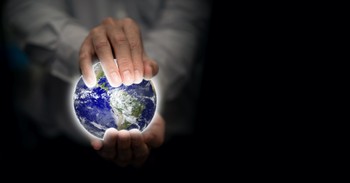Imagine a team of paleontologists eons from now, excavating the remains of ancient life. “Aha!,” says one, holding up a finger stained with petroleum grease. “Look here,” says another, brandishing a petrified Coca-Cola bottle. “Yes, this confirms it,” remarks a third, holding up a fossilized chicken bone. “This layer is Anthropocene.”
That’s precisely the scene one group of experts seemed to have in mind at this summer’s meeting of the International Geological Congress. The group’s chair, a professor at the University of Leicester, argued that human beings have so profoundly altered our planet that we have entered a new geologic era. The so-called “Anthropocene,” or “era of man,” will be easy to recognize in future rock layers by its distinctive strata of garbage, radioactive fallout, carbon pollution, and yes—chicken bones. At least, that’s what these scientists claim.
And there’s another marker of the Anthropocene: a so-called “Sixth Extinction.” The current die-off of species at the hands of human beings is so severe, say some scientists, that it’s comparable to the extinction of the dinosaurs and other major die-offs in Earth’s history.
“Nature is dead,” we might paraphrase Nietzsche, “and we have killed her.” But is this bleak picture of our relationship with all other life really accurate? Are we really entering the geologic era of man?
Let’s not flatter ourselves, says environmentalist and author Stewart Brand. In a recent essay at Aeon, Brand argues that notions like the “Anthropocene” and the “sixth extinction” aren’t just wrong. They’re a recipe for panic and paralysis when it comes to protecting our still-beautiful and wild Earth.
“Viewing every conservation issue through the lens of extinction threat is simplistic and usually irrelevant,” Brand writes. “Worse, it introduces an emotional charge that makes the problem seem cosmic and overwhelming rather than local and solvable.”
If doctors talked to their patients the way most environmentalists talk to the public, they’d begin every session by saying, “Well, you’re dying. Let’s see if we can do anything to slow that down a little.”
Brand argues that the “lazy romanticism about impending doom” undergirding notions like the “Anthropocene” and the “sixth extinction” is a “formula for hopelessness,” and therefore, failure.
Instead he offers a dose of reality: Almost all of the most recent extinctions have taken place on tiny ocean islands. And those species, while worth mourning, were of almost no ecological importance to the majority of the planet.
Meanwhile, stories like the recovery of the giant panda, which was recently removed from the endangered species list, show that when we focus on incremental and local solutions, humans can undo much of our own damage.
This idea that nature is “extremely fragile or already hopelessly broken” isn’t remotely the case, Brand writes. Nature is resilient, and if given the chance, it will rebound with remarkable speed.
It turns out our understanding of ourselves and our place in the environment is crucial to preserving that environment. We’re caretakers, not undertakers. And naming geologic eras after ourselves does nothing to preserve or tend the world over which God has placed us as stewards.
Will future paleontologists identify our era by its abundant chicken bones? Well, maybe. But if we cut the doom and gloom and see our relationship with nature accurately, they may just find plentiful evidence of pandas, as well.
BreakPoint is a Christian worldview ministry that seeks to build and resource a movement of Christians committed to living and defending Christian worldview in all areas of life. Begun by Chuck Colson in 1991 as a daily radio broadcast, BreakPoint provides a Christian perspective on today’s news and trends via radio, interactive media, and print. Today BreakPoint commentaries, co-hosted by Eric Metaxas and John Stonestreet, air daily on more than 1,200 outlets with an estimated weekly listening audience of eight million people. Feel free to contact us at BreakPoint.org where you can read and search answers to common questions.
John Stonestreet, the host of The Point, a daily national radio program, provides thought-provoking commentaries on current events and life issues from a biblical worldview. John holds degrees from Trinity Evangelical Divinity School (IL) and Bryan College (TN), and is the co-author of Making Sense of Your World: A Biblical Worldview.
Eric Metaxas is a co-host of BreakPoint Radio and a best-selling author whose biographies, children's books, and popular apologetics have been translated into more than a dozen languages.
Publication date:



